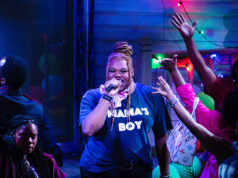As Oscar season heats up, and with the deafening buzz around Lady Gaga’s transcendent performance in A Star Is Born, I submit for your consideration that a local “star is born” via a breakout performance by an actress in an ensemble production: Chris Sanders as Cece in Jubilee Theatre’s Obama-ology.
In an always involving, thankfully non-polemical show written by Aurin Squire and briskly directed by Lisa Devine, revolving around Barack Obama’s historic presidential campaign in 2008 –– and among performances by a nimble five-person cast –– it is Sanders’ Cece who mesmerizes the most. At times reluctant, indignant, even militantly bitter, before conveying her ultimate redemption, this Cece never ceases to stir much of Obama-ology’s drama.
Despite the wonkiness of its title, Obama-ology steers clear of any political preaching. Rather, it centers on a campaign newbie, Warren (played with wide-eyed earnestness by Cuba Gooding Jr. lookalike Lee George), as he is coached to “get out the vote.”
Warren’s mentors in the door-to-door campaign grind are Barbara (a feisty Octavia Y. Thomas), the ever-gung-ho Sam (Jon Garrard), and the all-business Laura (Dayna Spring Fries).
Given the current, caustic political landscape, all the invocations of “Yes, We Can” from Obama campaign speeches seem as remote in their oratory power as grainy newsreels of J.F.K.’s lone inaugural address.
But it is to Obama-ology’s credit that it doesn’t wallow in blatant nostalgia for those inspiring words. Instead, it lasers in on the often-tedious campaign work and how no amount of enthusiasm and political commitment can make up for lagging voter registration numbers – even in the predominantly black neighborhoods of East Cleveland where the play takes place.
On a sparsely set stage (designed by Bob Lavallee), with its main focus being a bookshelf filled with the detritus of beer bottles and Obama bumper stickers, scenes shift seamlessly from campaign headquarters to Warren and his cohorts driving around, scavenging for voters and volunteers.
Warren ends up developing an affecting relationship with Cece, who eventually accepts his approach to sign up for the campaign.
To grasp fully Sanders’ remarkable range, please note that in one of her earliest scenes, she is on all fours doing a stunningly irritating rendition of a barking dog, looking to protect the lady of the house as she rebuffs Warren’s recruitment efforts.
Soon enough, Sanders’ too-human Cece will reject Warren’s initial offer of an Obama bumper sticker (“Don’t have a bumper to put it on,” Cece retorts) before eventually appearing at campaign headquarters, having succumbed to Warren’s sales pitch. And it will be the subsequent exchanges between Warren and Cece that create some of the play’s most poignant moments.
Cece’s rage at being stopped by a highway patrolman at 3 a.m. will be doused by the cool and calm Warren (remember no-drama Obama?), who understands the possibly fatal consequences of “driving while black.”
And in the play’s most tear-inducing moment, Sanders’ Cece channels Aretha Franklin in her gospel prime with a sung reflection on her station in life. Cece is resistant to Warren’s insistent desire to help her. To her, Warren’s attention amounts to unsolicited advice and charity. “Keep your pity,” she snaps at him.
The entire cast’s ability to shift roles is laudable. Thomas’ Barbara wears her skepticism of Warren like a badge of honor, yet that character’s withering disdain is completely erased when she transforms into a matronly lady whose sagging posture belies her politely firm reminder to Warren how blacks had to take a poll test that included reciting the Declaration of Independence –– which she quotes verbatim. She leaves Warren with a bitterly acquired pearl of wisdom: “It is so hard to follow all the rules and end up another broken tool.”
Meanwhile, Garrard easily toggles between Sam, the back-slapping campaign worker, and Brad, the eager new recruit wearing a hipster-approved wool cap as he arrives in Cleveland from the “country of Tribeca.” And Fries easily trades in her type-A campaign worker, Laura, for the bigoted convenience store clerk, Janice, who weeps out of pain when she realizes Obama will win.
After a wrenching debate about feeling like a “coward” for certain decisions she’s made, Cece will earn the play’s most gratifying epiphany by doing herself and her children proud as she joins in Obama’s historic triumph.
For all of the positive emotions coursing through Obama-ology, culminated by the hoisting of an Obama banner emblazoned with “hope,” it still can’t match the inspiration generated by the excerpts of Obama’s Democratic National Convention keynote address of 2004 and his acceptance speech following his 2008 victory over John McCain –– both of which fill Jubilee Theatre at the play’s beginning and end.
They are the most indelible reminders that the ultimate power underlying Obama-ology lies both in the legions of obscure people who toiled to spread his message and in the undeniable conviction – and, yes, the “audacity” – of Obama’s words.
Obama-ology
Thru Feb 24 at Jubilee Theatre, 506 Main St, FW. $15-30. 817-338-4411.












